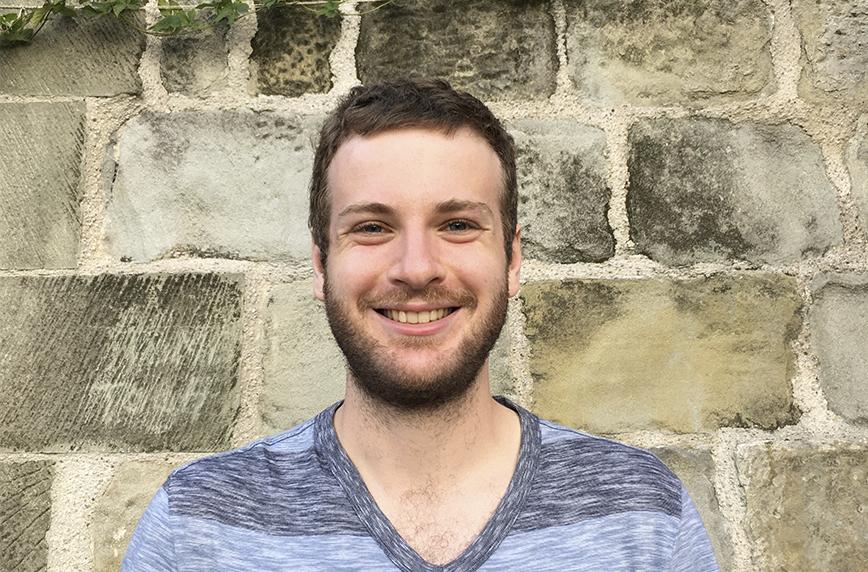As a student, it is very easy to travel to/from KTH, as the metro station is located right in front of the main entrance
Giancarlo previously studied chemistry at the University of São Paulo (USP), Brazil. When indoors he loves to cook (and eat); when outdoors he enjoys a good hike.

Why did you choose this master’s programme at KTH?
When I was searching for a university to do my master’s, I prioritised both quality of life and quality of education. I knew that Stockholm was a great choice as it offers a perfect combination of city life and nature. However, what really convinced me about coming to KTH were the courses offered by the programme, which cover all the concepts that interested me at the time. As a chemist, I have a deep scientific understanding of pure and applied (bio)chemistry, but I knew that in order to follow my intended career it would be necessary to deepen my knowledge of industrial biotechnology.
What are the best aspects of your programme?
The tracks offered by the programme are really excellent. They provide a collection of courses that complement each other and give you the knowledge you need to pursue your intended career. As biotechnology is a very interdisciplinary field of study, the fact that you can mix and match several courses is really good.
Have you chosen a specialisation track within the programme? If Yes, which track and why?
I am currently following the Cell-Based Process Biotechnology (CBPB) track. I am also taking some courses from the Enzyme Biotechnology track (ENZB). I believe that, environmentally wise, these two approaches complement each other as better alternatives to current chemical-based industrial solutions.
What are your favourite courses thus far?
By far the best courses are “Metabolic Engineering” and “The Cell Factory” from the CBPB track. These were the courses that convinced me to enrol in the programme when I was researching my master's degree. I have learned a lot from them and now feel much more confident in discussing and working on biotechnology projects.
How do studies at KTH differ from your previous studies?
When I did my bachelor’s at my home university, there were many semester-long courses with several evaluations (exams) during the six months. Here at KTH I had to adapt to the four-period system, in which the courses last for only two to three months, although the lectures are much more frequent. In this model, you have to study on a daily basis in order to keep track of the course, as the final exam happens much sooner than what I was used to.
The grading system at KTH also differs from the one at my home university. I was used to a simple and direct grading system in which you need to achieve a certain percentage of the maximum amount of points in order to pass the course. Here at KTH, the grading system is based on the “intended learning outcomes” of the course, meaning that the students must show that they have mastered each one of the course topics.
How is student life in Stockholm?
All my life I have lived in São Paulo, which has a population of over 12 million people. So I imagined that Stockholm, with a population of less than one million people, would be very quiet, almost boring. I couldn’t have been more wrong. Stockholm is a very international city, with a perfect combination of city life and nature. As a student, it is very easy to travel to/from KTH, as the metro station is located right in front of the main entrance. Also, the city is full of bicycle lanes, making it easy to cycle almost anywhere!
How would you describe your time at KTH so far?
Study wise, student life at KTH is very well balanced. After spending some time adapting, I think I am now in sync with the proper pace of study and feel that I am learning a lot. The professors are always approachable, so I’m not afraid about asking questions or speaking my mind. Since my first day, all my classmates – both Swedish and international – have been super friendly and welcoming. Both campuses offer great places to study or relax, individually or in groups.
What do you want to do after graduating?
After graduating, I am intending to seek a PhD abroad, whether at a university or in industry. KTH offers great exchange opportunities that encourage you to seek your dreams anywhere in Europe and even globally.
What would you like to say to students thinking of choosing KTH for their master’s studies?
Doing my master’s at KTH was the first step to achieving my international career goals. I am learning a lot and enhancing the tools that are essential to pursuing my dreams. If you feel that your journey might also pass through KTH, here are some thing to keep in mind:
If you are not offered accommodation via KTH Accommodation, start looking for accommodation as soon as you can, as finding housing in Stockholm can be tricky. Also, pay particular attention to your visa requirements as the Swedish Migration Agency is quite busy. Please don’t hesitate to ask me any questions – or anyone at KTH. If the person can’t help you, they will help you reach someone who can. I hope to see you soon! Hej då!
